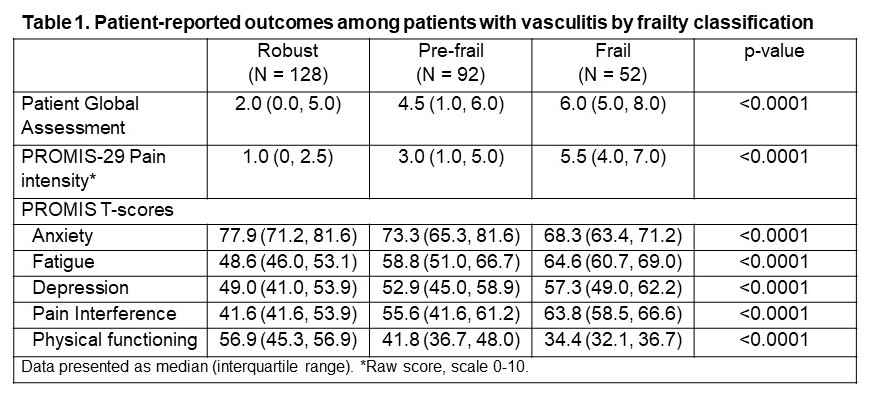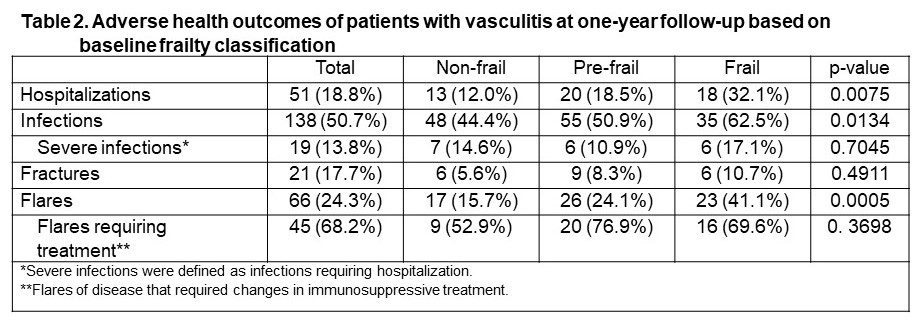Session Information
Date: Monday, November 13, 2023
Title: (1534–1553) Vasculitis – ANCA-Associated Poster II: Epidemiology, Outcomes, & Classification
Session Type: Poster Session B
Session Time: 9:00AM-11:00AM
Background/Purpose: Frailty is associated with poor health outcomes including increased risk of hospitalizations, infections, and fractures. In the baseline survey of the VascStrong study, we reported a high prevalence of frailty and pre-frailty in participants with multiple forms of vasculitis. The 1-year follow-up survey collected data on adverse health outcomes, patient-reported outcomes (PRO), and a reassessment of self-reported frailty.
Methods: VascStrong was a longitudinal study using the Vasculitis Patient-Powered Research Network (VPPRN), an internet-based prospective longitudinal cohort. All participants of the baseline survey were invited to participate in the 1-year follow-up survey.
Data elements collected included type of vasculitis, demographic, medications, and PROs that included a patient global assessment (PGA) and several domains of the Patient-Reported Outcomes Measurement Information System (PROMIS). Frailty was measured by the FRAIL scale, a self-reported tool, and patients were classified as robust, pre-frail, and frail based on meeting 0, 1-2, or ≥ 3 criteria, respectively.
Participants reported the occurrence over the prior year of hospitalizations, infections, fractures, and disease flares. Data were analyzed by frailty classification (baseline and follow-up).
Results: Between October 28, 2022 and January 26 2023, 272/328 participants (82.9%) responded to the follow-up survey. Most participants were female (71.0%) and non-Hispanic white, and the most common diagnosis was granulomatosis with polyangiitis (39.0%), followed by eosinophilic granulomatosis with polyangiitis (14.3%), and microscopic polyangiitis (12.9%). Mean age of participants was 62.5 years.
Prevalence of robustness, pre-frailty, and frailty was 47.1%, 33.8%, and 19.1%, respectively. PROs at follow-up showed similar associations to baseline with pre-frail and frail patients reporting worse pain (intensity and interference), fatigue, depression, and physical function (Table 1). The majority of participants were classified similarly to their baseline assessment (75%, 50.9%, and 66.1% for robust, pre-frailty, and frailty, respectively). However, transitions in frailty classification between consecutive states were observed from robust to pre-frail (21.2%), pre-frail to robust (38.9%), pre-frail to frail (10.2%), and frail to pre-frail (25%) (Figure 1). Transitions from frail to non-frail (8.9%) or non-frail to frail (3.7%) were rare.
Hospitalizations, infections, and flares were most frequent in participants classified as frail at baseline (Table 2). Similar observations were made using follow-up frailty classification. No difference was observed in severe infections and fractures, that were overall uncommon in the cohort.
Conclusion: At 1-year follow-up, pre-frailty and frailty remained prevalent among patients with vasculitis and were associated with worse PROs. Transitions in frailty status were observed among participants, showing that amelioration of frailty is achievable in a subset of patients with vasculitis. Among patients with vasculitis, pre-frailty and frailty are associated with a substantial 1-year risk of hospitalizations, infections, and flares of disease.
Data presented as median (interquartile range). *Raw score, scale 0_10.
*Severe infections were defined as infections requiring hospitalization.
**Flares of disease that required changes in immunosuppressive treatment.
To cite this abstract in AMA style:
Sattui S, Stadler J, Borchin R, Burroughs C, Yeung C, Merkel P, Spiera R. The Association of Frailty with Outcomes in Patients with Vasculitis [abstract]. Arthritis Rheumatol. 2023; 75 (suppl 9). https://acrabstracts.org/abstract/the-association-of-frailty-with-outcomes-in-patients-with-vasculitis/. Accessed .« Back to ACR Convergence 2023
ACR Meeting Abstracts - https://acrabstracts.org/abstract/the-association-of-frailty-with-outcomes-in-patients-with-vasculitis/



